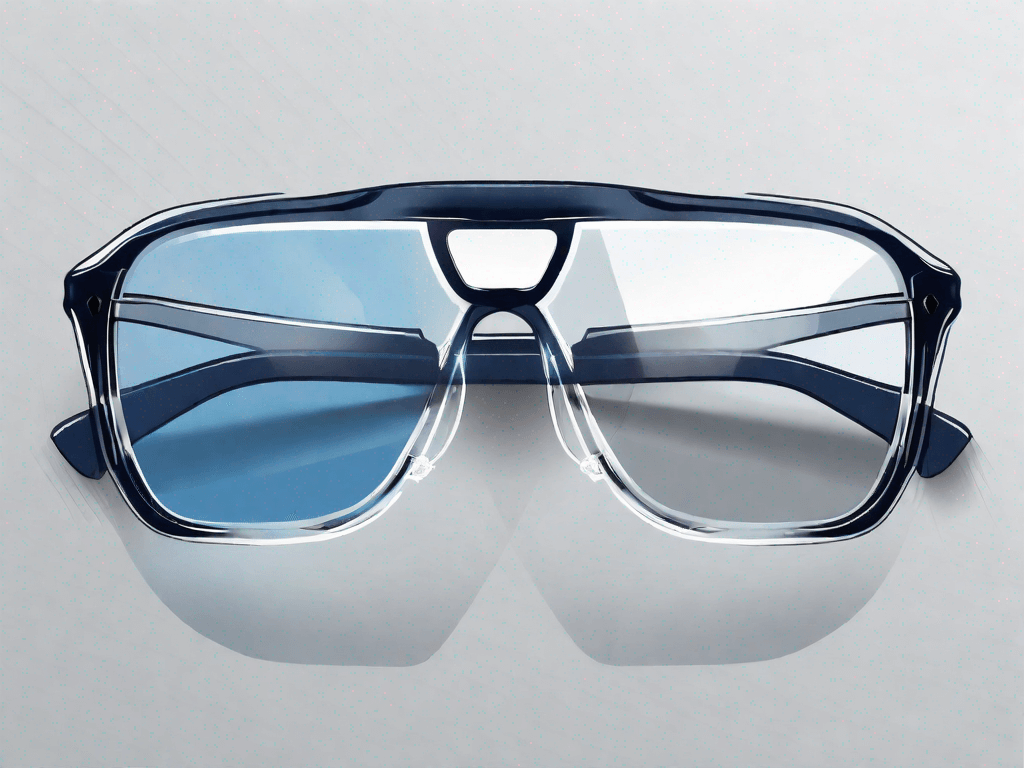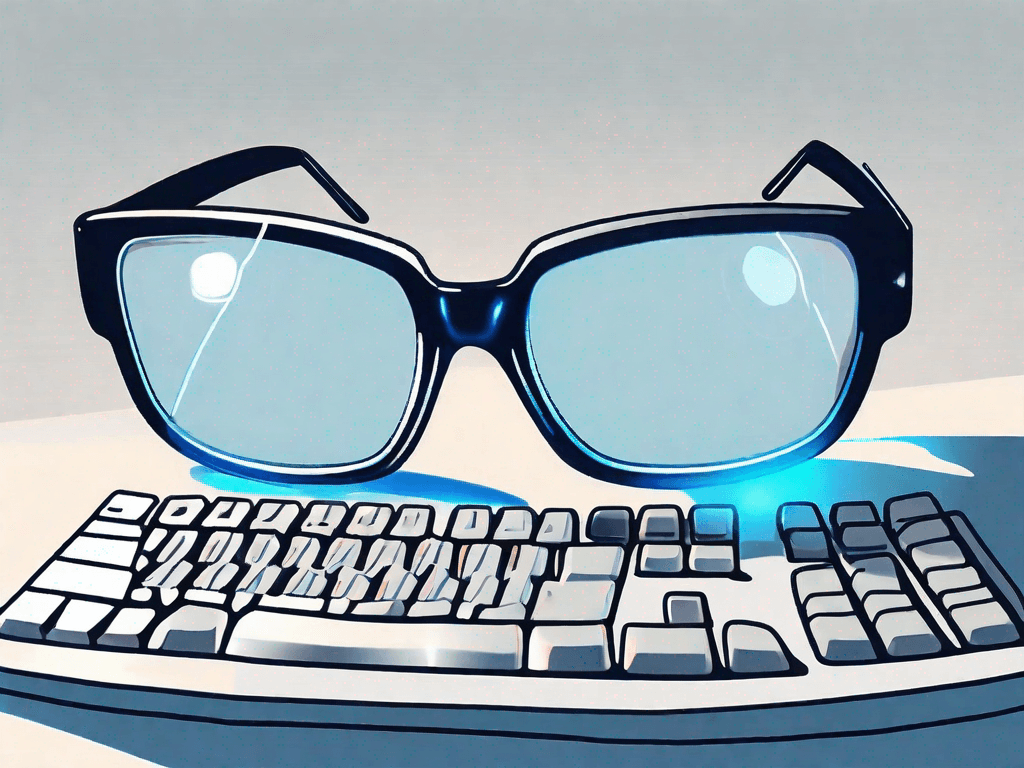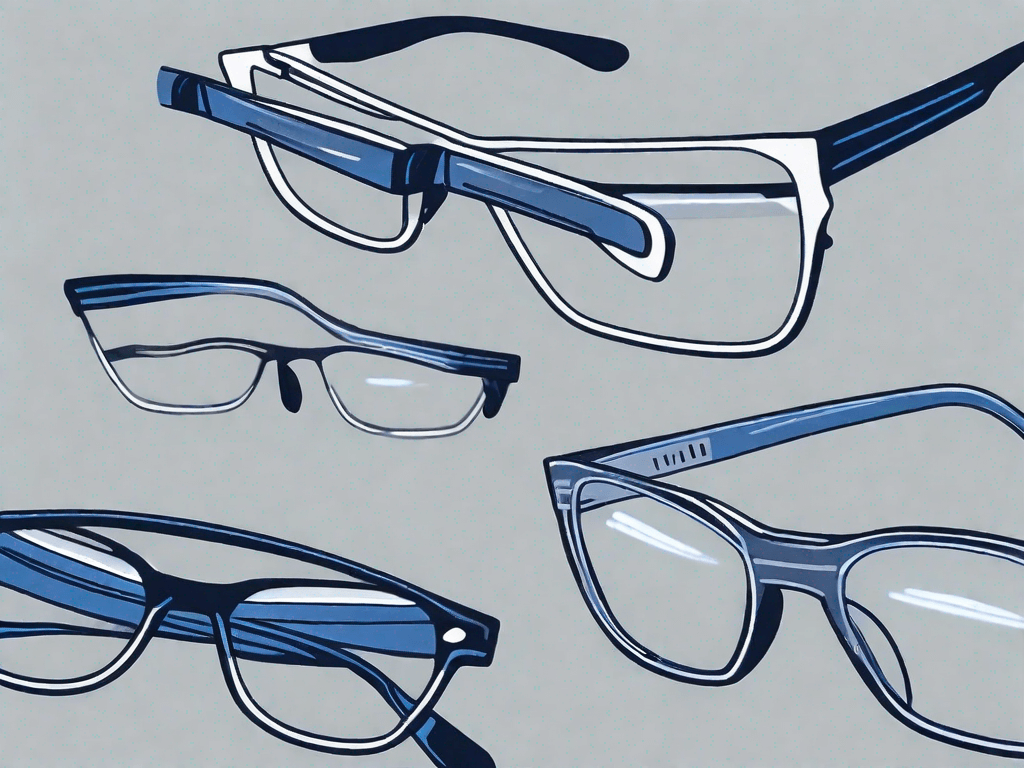Do Blue Light Filter Glasses Look Different?
Blue light filter glasses have gained popularity in recent years as people spend more time in front of screens. These glasses are designed to block or filter out blue light, which is emitted by electronic devices such as smartphones, computers, and tablets. But do blue light filter glasses look different from regular glasses? Let's explore the science and appearance of these glasses to find out.
Understanding Blue Light Filter Glasses
Blue light filter glasses, also known as blue-blocking glasses or computer glasses, are specially designed to reduce the amount of blue light that reaches your eyes. They are equipped with special lenses that have a yellow or amber tint. This tint filters out a portion of the blue light while allowing other wavelengths to pass through.
What are Blue Light Filter Glasses?
Blue light filter glasses are eyewear accessories that can be worn over prescription glasses or used as standalone glasses for individuals without vision correction needs. They are primarily designed to reduce the negative effects of blue light exposure, such as eye strain, fatigue, and disrupted sleep patterns.
The Science Behind Blue Light Filter Glasses
Blue light, which has a short wavelength and high energy, is known to penetrate the eye more deeply than other types of light. This can cause digital eye strain, dryness, and long-term damage to the retina. Blue light filter glasses work by selectively blocking or filtering out a portion of the blue light spectrum, reducing its intensity and minimizing potential harm to the eyes.
Research suggests that filtering blue light can improve visual comfort, reduce eye fatigue, and mitigate the potential long-term effects of blue light exposure. However, the extent of these benefits may vary depending on individual factors and the specific design of the blue light filter glasses.
Blue light filter glasses have gained popularity in recent years due to the increasing use of digital devices and artificial lighting sources that emit high levels of blue light. With the rise of smartphones, tablets, and computers, people are spending more time exposed to blue light, which can have detrimental effects on their eye health.
When you wear blue light filter glasses, the yellow or amber tint of the lenses helps to block a significant portion of the blue light emitted by electronic devices. This can reduce eye strain and discomfort, allowing you to use your devices for longer periods without experiencing fatigue or dryness.
Furthermore, blue light exposure has been linked to sleep disturbances. The blue light emitted by screens can suppress the production of melatonin, a hormone that regulates sleep-wake cycles. By wearing blue light filter glasses in the evening or before bedtime, you can minimize the impact of blue light on your sleep patterns and promote better quality sleep.
It's important to note that not all blue light is harmful. In fact, some exposure to blue light during the day can be beneficial, as it helps regulate our circadian rhythm and boosts alertness. Blue light filter glasses are designed to selectively filter out the harmful portion of blue light while allowing the beneficial wavelengths to pass through.
When choosing blue light filter glasses, it's essential to consider the quality of the lenses. High-quality lenses should effectively filter out blue light without distorting colors or causing visual discomfort. Look for glasses that have been tested and certified to block a significant percentage of blue light, such as those with a blue light protection rating of 90% or higher.
In conclusion, blue light filter glasses are a valuable tool for reducing the negative effects of blue light exposure. By selectively filtering out harmful blue light, these glasses can help alleviate eye strain, fatigue, and sleep disturbances caused by excessive screen time. When choosing blue light filter glasses, opt for high-quality lenses that provide effective protection while maintaining visual clarity and comfort.
Appearance of Blue Light Filter Glasses
One common concern when considering blue light filter glasses is whether they will look different from regular glasses. Let's explore the design and style variations, as well as the impact of lens color and material.
Design and Style Variations
Blue light filter glasses are available in a wide range of designs and styles. They can resemble regular glasses or have a more specialized appearance. Some brands offer sleek and modern frames, while others feature retro or classic designs. With the increasing demand for blue light filter glasses, you can find a style to suit your personal taste and fashion preferences.
For those who prefer a minimalist look, there are frameless options available. These glasses have lenses that are held in place by discreet and lightweight temples. This design not only provides a sleek and modern aesthetic but also reduces the overall weight of the glasses, making them more comfortable to wear for extended periods.
If you're someone who likes to make a bold fashion statement, there are blue light filter glasses with vibrant and eye-catching frames. These frames come in various colors and patterns, allowing you to express your unique personality and style. Whether you prefer a pop of bright red or a trendy tortoiseshell pattern, there is a frame out there that will make you stand out from the crowd.
Lens Color and Material
The lenses of blue light filter glasses are typically tinted with a yellow or amber color. This tint helps to filter out the blue light while allowing other colors to be perceived as normal. The intensity of the tint can vary depending on the specific glasses and brand.
Some blue light filter glasses offer lenses with a subtle tint, making them almost indistinguishable from regular glasses. These glasses are perfect for those who want the benefits of blue light protection without compromising the natural color perception of their surroundings.
On the other hand, there are blue light filter glasses with lenses that have a more pronounced tint. These glasses not only provide enhanced blue light protection but also add a touch of warmth to your vision. The amber tint can create a soothing effect, especially when using electronic devices in low-light environments.
In terms of material, blue light filter glasses are commonly made with high-quality lenses that provide clarity and durability. Polycarbonate and Trivex lenses are popular choices due to their impact resistance and lightweight properties. These materials are also compatible with prescription lenses for individuals who require vision correction.
Polycarbonate lenses are known for their exceptional durability and resistance to impact. They are highly recommended for those who lead an active lifestyle or work in environments where the glasses may be subjected to rough handling. These lenses are also lightweight, making them comfortable to wear for long periods.
Trivex lenses, on the other hand, offer similar benefits to polycarbonate lenses but with added optical clarity. They provide excellent visual acuity and are ideal for individuals who require precise vision, such as professionals who work with detailed tasks or avid readers.
Regardless of the lens material you choose, blue light filter glasses are designed to provide both protection and style. With their various design options and lens colors, you can find a pair that not only enhances your visual comfort but also complements your personal style.
Comparing Blue Light Filter Glasses and Regular Glasses
While blue light filter glasses may have certain distinct features, they also share similarities with regular glasses. Let's explore the differences in visual perception and the impact on eye comfort and health.
Differences in Visual Perception
Blue light filter glasses may slightly alter the perception of colors due to the yellow or amber tint of the lenses. This tint can make blues and other colors appear slightly warmer or more yellow. However, the effect is usually minimal and should not significantly impact your ability to see and distinguish colors accurately.
It's important to note that the yellow or amber tint of blue light filter glasses is specifically designed to block or filter out the harmful blue light emitted by digital screens. This tint helps to reduce eye strain and fatigue caused by prolonged exposure to blue light. While it may slightly affect color perception, the benefits of protecting your eyes from blue light outweigh this minor alteration.
Regular glasses, on the other hand, are fitted with transparent or prescription lenses that do not alter color perception. Therefore, if color accuracy is crucial for your specific activities, such as graphic design or professional photography, you may prefer to use regular glasses in those situations.
When it comes to visual perception, both blue light filter glasses and regular glasses serve different purposes. Blue light filter glasses prioritize eye protection and comfort, while regular glasses focus on vision correction without altering color perception.
Impact on Eye Comfort and Health
Blue light filter glasses can provide relief from eye strain and fatigue caused by prolonged exposure to blue light. By blocking or filtering out a portion of the blue light spectrum, these glasses can help reduce discomfort and improve overall eye comfort, especially during extended screen time.
In addition to reducing eye strain, blue light filter glasses have been found to potentially improve sleep quality. Exposure to blue light in the evening can disrupt the body's natural sleep-wake cycle by suppressing the production of melatonin, a hormone that regulates sleep. By wearing blue light filter glasses in the evening, you can minimize the impact of blue light on your sleep patterns and promote better sleep hygiene.
On the other hand, regular glasses primarily serve to correct vision and provide clarity. While they may offer some protection from environmental elements and potential eye injuries, they do not offer the same targeted benefits as blue light filter glasses in terms of reducing blue light exposure.
It's worth noting that prolonged exposure to blue light from digital screens has been associated with various eye health issues, including digital eye strain, dry eyes, and macular degeneration. Blue light filter glasses can play a significant role in minimizing these risks and maintaining long-term eye health.
In conclusion, while blue light filter glasses and regular glasses may share similarities, they differ in terms of visual perception and impact on eye comfort and health. Blue light filter glasses prioritize eye protection and comfort by reducing blue light exposure, while regular glasses focus on vision correction without altering color perception. Both types of glasses have their own unique benefits and are suited for different situations and individual needs.
Choosing the Right Blue Light Filter Glasses
When considering blue light filter glasses, it's important to choose the right pair that suits your specific needs. Let's explore some factors to consider when buying blue light filter glasses and helpful tips for first-time users.
Factors to Consider When Buying
When purchasing blue light filter glasses, there are several factors to consider to ensure you make the right choice.
Firstly, pay attention to the quality of the lenses. Look for glasses that have high-quality lenses specifically designed to block or filter out blue light effectively. The lenses should have a high level of blue light protection to minimize the potential harmful effects on your eyes.
Secondly, consider the design and comfort of the frames. Blue light filter glasses come in various styles and frame materials. It's important to choose a pair that not only provides the necessary protection but also fits comfortably on your face. Look for frames that are lightweight and have adjustable nose pads or temples for a customized fit.
Additionally, check if the glasses offer any additional features or functionalities. Some blue light filter glasses may have anti-glare coatings to reduce eye strain further. Others may be designed to be compatible with digital devices, allowing you to use them while working on a computer or using a smartphone.
Lastly, it's crucial to ensure that the glasses block or filter out a significant amount of blue light. The effectiveness of blue light filters can vary among different brands, so read reviews or consult with an eye care professional to find a reputable brand that offers reliable protection.
Tips for First-Time Users
If you are new to using blue light filter glasses, here are some helpful tips to make the adjustment process easier:
1. Start by wearing the glasses for short periods, gradually increasing the duration. This allows your eyes to acclimate to the yellow or amber tint of the lenses. Initially, you may find the color distortion slightly unusual, but with time, your eyes will adjust, and you'll experience the benefits of reduced eye strain and improved sleep quality.
2. Clean your glasses regularly to maintain their effectiveness. Blue light filter glasses can accumulate dust, fingerprints, and smudges, which can affect their performance. Use a microfiber cloth and lens cleaner specifically designed for eyewear to keep your glasses clean and clear.
3. Properly store your glasses when not in use. Invest in a protective case to prevent any accidental damage or scratches. Avoid placing the glasses face down on hard surfaces, as this can lead to scratches on the lenses.
4. If you wear prescription glasses, consider getting blue light filters added to your lenses. Many opticians offer this option, allowing you to have the benefits of blue light protection without needing to wear an additional pair of glasses.
By following these tips, you can maximize the effectiveness and longevity of your blue light filter glasses, ensuring optimal eye health and comfort.
Common Misconceptions About Blue Light Filter Glasses
Despite the growing popularity and proven benefits of blue light filter glasses, there are some common misconceptions that need to be addressed. Let's debunk some of the myths about appearance and effectiveness.
Debunking Myths About Appearance
Contrary to popular belief, blue light filter glasses do not necessarily make everything appear yellow or alter your overall vision significantly. The tinted lenses are designed to selectively filter out blue light while allowing other colors to be perceived accurately. The appearance of blue light filter glasses can vary depending on individual preferences, brand, and specific lens properties.
Addressing Concerns About Effectiveness
Some people question the effectiveness of blue light filter glasses, believing that they may not provide substantial benefits or that their effects are purely psychological. However, numerous scientific studies support the use of blue light filter glasses for reducing eye strain, improving comfort, and minimizing potential damage associated with blue light exposure.
It's important to note that while blue light filter glasses can be beneficial, they are not a cure-all solution for all eye-related issues. They should be used in conjunction with other healthy eye care practices, such as taking regular breaks from screens, practicing the 20-20-20 rule, and maintaining good overall eye health.
In Conclusion
Blue light filter glasses are designed to reduce the negative effects of blue light exposure, such as eye strain and fatigue. While blue light filter glasses may look slightly different from regular glasses due to their yellow or amber tint, the visual impact is minimal and should not interfere with color perception. It's important to choose high-quality blue light filter glasses that suit your specific needs and consider helpful tips for first-time users. Despite some misconceptions, scientific research supports the benefits of blue light filter glasses in promoting eye comfort and reducing potential harm from blue light exposure. So, if you spend a significant amount of time in front of screens, investing in blue light filter glasses may be a worthwhile choice for your eye health and well-being.





